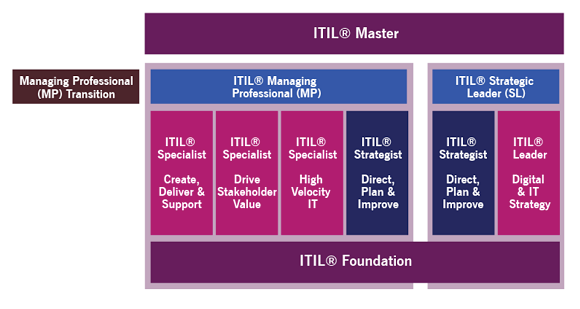Is ITIL certification worth your time and effort?
All of us have aspired to have some sort of technical certification to enhance our career. According to Wikipedia, a professional certification is one “where a person is certified as being able to competently complete a job or task, usually by the passing of an examination and/or the completion of a program of study.”
However, increasingly certifications (or rather ITIL certification) and training programs are becoming a ‘thing to add in your resume’, and not delivering the value they are supposed to bring. During my casual conversations at events and meet-ups, a common underlying theme has been about the mismatch between the performance of people (with certifications) and the knowledge they have gained from those certifications.
Given the above premise, does having an ITIL certification really help you professionally? Does an ITIL certification really solve everything? Here’s my take on whether an ITIL certification is worth the buck and time!
How does ITIL certification work?
ITIL certification is split into five stages, namely foundation, practitioner, intermediate, expert and master levels. Each of these levels has different requirements for appearing, clearing and is awarded a specific set of credits. For instance, one needs to have a total of 22 credits to be certified as an expert. Apart from these, there are complementary certifications that help you reach the expert level faster. Here’s an overview of the various levels and credits.

Is getting ITIL certified and being successful linear?
Let’s get this straight – getting a certification is not rocket science in today’s day and age. A certification merely demonstrates that you’ve studied and cleared an examination. It doesn’t give you wings and doesn’t solve all the world’s problems. One of the primary reasons why certifications and other training programs are losing their relevance is that it’s possible to pass the certification and still not learn ANYTHING practical about the subject.

However, ITIL certification is different. Having an ITIL certification doesn’t make us an ‘expert’ for any specific skill set. As you might already be aware, ITIL is a set of best practices and is descriptive in nature. Hence an ITIL certification isn’t about doing your job, but merely about knowing the ITIL principles. In fact, that’s precisely the reason why AXELOS have now added the ITIL Practitioner level which makes it mandatory for IT folks to apply their theoretical knowledge in practice.
Also, adoption of ITIL requires an understanding of the ITIL framework and a buy-in from folks at various levels. It’s as much about a cultural shift and embracing change as it is about knowing the best practices in IT service management. Any cultural shift requires you to have a sound understanding of ‘why’ you’re making that change. It’s a strong reason why a certification in ITIL makes sense. It validates that the individual is equipped with the basics like vocabulary, processes, hierarchy, goals, and IT’s alignment with the business. GamingWorks have conducted workshops with more than 4000 organizations around the world and every year for the last 15 years a top scoring ABC (Attitude, Behaviour, Culture) card has been ‘IT has too little understanding of business impact and priority’ – it seems that many do not know the why!
For successful adoption of ITIL for your service desk, all the stakeholders need to be on the same page, speak the same language, work towards the same goals by succeeding in iterative and incremental projects. As David Moskowitz puts it, “Adopting ITIL involves a learning process as continual improvement is applied”. A certification indicates that you’re learning, and the knowledge is just a minor component of a successful adoption (or a career in ITSM). Click To Tweet
Experience and ITIL certification need to go hand in hand
As Paul Wilkinson points out here, nearly 85% of folks he meets have undergone ITIL training (out of 15,000 people). Only 2% of these folks measure the impact in terms of cost, value, risks and other outcomes of their IT initiatives. This is one of the primary reasons why ITIL certified companies don’t get the desired results or an ROI for the cost spent on getting their folks ITIL certified.
When I spoke to an ITSM expert, here’s what they had to say-
ITIL is not unique in any way, when it comes to the value of professional qualifications overall – many see them as check-box exercises (important to get the certificate, less important to understand the subject, and almost not important at all to do anything with the new knowledge)
That’s one of the reasons why Axelos has a practitioner level where it requires a combination of both practical and theoretical knowledge. According to Axelos, the ITIL practitioner level “enables practitioners to not only speak the language of ITIL but be able to translate it and use it in practice”. So, an ITIL certification without the knowledge of how to use it in practice is just a sheet of paper.
What is happening to ITIL certification post ITIL 4?
The ITIL 4 is set to be released during the Q1 of 2019.
ITIL offers a huge suite of benefits for any kind of organization having an IT department. Almost every organization has ITIL practitioners and project managers working on big impact IT projects.
That’s one reason why there was a lot of stir when the new version of ITIL called ITIL 4 was announced. Axelos suggested that this would just not be an update to what is existent in the ITIL V3, but also would have qualitative aspects to ITIL like- Culture, adaption, among others. Not just this, ITIL 4 is going to have a restructured certification path.
The big question- Will the current ITIL certification hold good after ITIL 4?
As Akshay Anand- Global Ambassador for ITIL 4 pointed out in our webinar,
“…And let me be absolutely clear, right now we are not invalidating anyone, certification certifications will still be valid”
However, the changes to the ITIL framework would affect people currently pursuing the ITIL V3 certification. Those studying the ITIL V3 certification would not be simply able to take the examination without some transition into ITIL 4.
What is the ITIL 4 certification path?
According to Axelos, the first release of ITIL 4 will be in Q1 of 2019- The foundation level. The subsequent levels will be released in H2 of 2019.
Axelos has provided with a clear cut scheme (shown below) that is aligned with ITIL v3 and provides a very clear cut path for practitioners and others to continue with their ITIL certification journey.

Here’s some deep-dive into each of the modules of ITIL certification
ITIL managing professional (ITIL MP)- This module is focussed on providing one with practical and technical knowledge about how to successful IT workflows, teams, and projects at scale.
ITIL strategic leader (ITIL SL)- This module is focussed on bringing the alignment between IT teams and business functions. Being certified with ITIL SL demonstrates that a professional has a very clear understanding of how IT teams influences and directs business strategy.
As you can see from the pictorial representation, obtaining either of ITIL MP or ITIL SL, one must complete all the modules under each stream- With ITIL strategist being the necessary module for ITIL MP and ITIL SL certifications.
So what’s the path if you have ITIL v3 certification?
Axelos has managed to iron any major concerns with regards to transitioning from old ITIL certification to the new one. Here’s a deep dive into the same.

Final word – Is ITIL certification really worth it?
I would like to address this in two parts
- Will it help you get a job (or enhance your career)
- Will an ITIL certification be worth the buck?
All said and done, you will have a better chance of catching an employers attention if you have an ITIL certification. In fact, ITIL certification is used as a basic filter by many employers to weed out candidates. But does that guarantee you a job? Probably not. A good experience, backed by a stellar demonstration of skills gained via certification is going to better equip you for the challenges your work life throws at you. Echoing the same statement, Stuart Rance of Optimal service management adds that
“The value of certification depends on your age, your job role, the country and market you work in and many other factors. Simply put, a certification is no replacement for the wealth of experience.”
So, is it worth the buck? Definitely yes, if you’re able to demonstrate the value of your knowledge in your work. Having spoken to a sizeable number of IT consultants, practitioners, IT agents, I have seen that people who succeed with an ITIL certification are those who have put an effort into earning their certificate, and not just seen it as a way of checking a box for their career. Your goal should be acquiring knowledge and putting it in practice, measuring the impact of your work and not just ‘passing’ the certification.
Remember. Having an ITIL certification is just a start.
Also, just in case you haven’t had enough, here are some resources I enjoyed reading on similar topics
- Is getting your ITIL certification worth it?
- Ten certifications that actually mean something
- The real cost of getting an ITIL certificate by the IT Skeptic
- Will ITIL certification help me get a job?
- Has ITSM training focus on guaranteed pass rates gone too far?
- ITIL certification? Yeah, cause that’ll solve everything.



